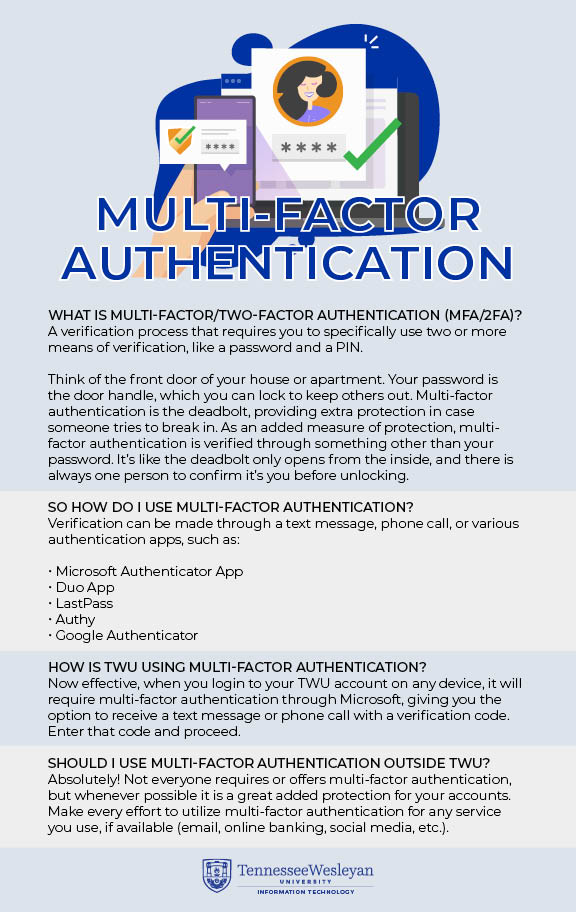Information Technology
November 29, 2023 2024-09-18 23:35Information Technology
Tennessee Wesleyan Information Technology Services endeavors to promote educational innovation and administrative excellence through the strategic use of technology in alignment with the University’s mission.
The Information Technology Department is located on the lower level of Lawrence Hall.
Hours of Operation: M-F 8:30 a.m. – 5 p.m.
Phone: (423) 746-5339
Email: helpdesk@tnwesleyan.edu
TWU Knowledge Base
Help Desk
Contact the IT Help Desk if you need technology assistance.
MyPortal
MyPortal is Tennessee Wesleyan’s intranet site that helps you stay connected to and informed about campus. Search course listings, register for classes, and more.
Sakai
Sakai is TWU’s online learning management system.
Access your TWU email and your OneDrive account.
Don't Get Phished

What Is Multi-Factor Authentication

Cyber Security Best Practices

Acceptable Use of Campus Technology Resources
Access to computing devices and electronic/data resources owned or operated by Tennessee Wesleyan University imposes certain responsibilities and obligations and is granted subject to university policies, and local, state, and federal laws. These resources are available to students, faculty, and staff for their authorized use in a responsible, ethical, and equitable manner that does not infringe upon the rights of others or expose the University to unnecessary risks. This policy provides general guidelines for the appropriate use of these information resources.
Applicability
Applies to all University students, faculty and staff, and all others using computer and communication technologies, including the University’s network, whether personally or University owned, which access, transmit or store University or student information.
Acceptable Use Policy
Users accept personal responsibility for the appropriate and lawful use of IT resources. Tennessee Wesleyan University does not impose restrictions on the use of electronic resources that are contrary to the established culture of openness, academic freedom, free inquiry, and free expression. The Information Technology Department is committed to protecting our employees, partners, and the university from illegal or damaging actions by individuals, either knowingly or unknowingly.
The list below constitutes the Acceptable Use Policy and code of computing practices for all persons using the Tennessee Wesleyan University computer systems.
· Users are responsible for being aware of and following the published procedures for accessing the computer systems.
· Users must use only the computer accounts that have been authorized for their use. They must use the computer accounts only for the purposes for which they are authorized. Use of Tennessee Wesleyan University’s computer resources for personal or business financial gain without express authorization is prohibited.
· Users are responsible for the use of their computer accounts. Users should make use of system-provided protection features such as passwords, and they should take precautions against others obtaining access to their computer resources. Do not make your account available to others for any purpose.
· Users will not attempt to circumvent or subvert system or network security measures.
· Do not access or copy the programs, files, or data belonging to other persons or to Tennessee Wesleyan University without prior authorization. Do not attempt to access files for which you do not have authorization. Programs and data provided by Tennessee Wesleyan University are not to be taken to other computer sites without permission.
· Users may use software on Tennessee Wesleyan University’s computers only with permission of the supervisor of that computer if that software has been legally obtained, and if its use does not violate any license or copyright restriction.
· Do not use programs on Tennessee Wesleyan University’s computers that were obtained from other computer sites unless they are in the public domain or authorization to use them has been obtained.
· To minimize the impact of your work on the work of other users, you must not attempt to encroach on others’ use of the facilities or deprive them of resources. Deliberate wasteful use of resources is prohibited.
· Users are expected to conduct themselves in a manner that does not offend or harass others and that does not interfere with individual and campus activities. Resources are not to be used to store or transmit obscenities or other potentially offensive material including but not limited to abusive use of email.
· Do not attempt to modify system facilities. Do not misuse, damage or misappropriate computer equipment.
*(Copies of some codes may be found in computer labs or in the Merner-Pfeiffer Library. Others can be located through resources in the library.)
Personally Owned Resources
The use of personally owned resources and devices is permitted in conducting university business, though it is not a requirement. Individual offices may decide to permit such use at their discretion.
Personally owned resources used for university business are subject to this policy and must comply with all requirements herein. Those resources are also subject to any secondary requirements as required by the Information Technology Services Department for accessing campus resources (security controls, encryption, disaster recovery, etc.).
Consequences of Misuse of Information Resources
Disciplinary action for violating this code shall be governed by the applicable provisions of the student, faculty and/or staff handbooks, and/or other policies and procedures of Tennessee Wesleyan University.
The following disciplinary sanctions may be taken either singularly or in combination. by the institution against violators of this code.
· Restitution to reimburse the Institution for damage to or misuse of computing facilities.
· Warning the individual that continuation or repetition of a specified conduct may be cause for other disciplinary action.
· Written reprimand indicating that further violation may result in more serious penalties.
· Restriction of computing privileges for a specified period.
· Probation status, with the associated implications, is imposed on the individual.
· Suspension or expulsion of the individual from the institution.
· Termination of employment of the individual by the institution.
· Interim or summary suspension until a final determination has been made regarding the charges made against the individual.
If other institutional regulations are violated, additional penalties may be imposed. Tennessee Wesleyan University reserves the right to pursue prosecution for violations covered under other civil and criminal statutes.
Disclaimer
Tennessee Wesleyan University disclaims any responsibility and/or warranties for information and materials residing on non-University systems or available over publicly accessible networks. Such materials do not necessarily reflect the attitudes, opinions, or values of Tennessee Wesleyan University, its faculty, staff, or students.










